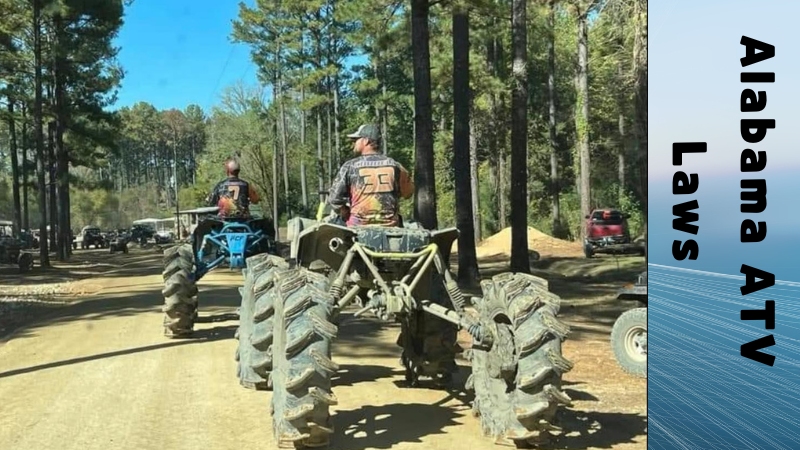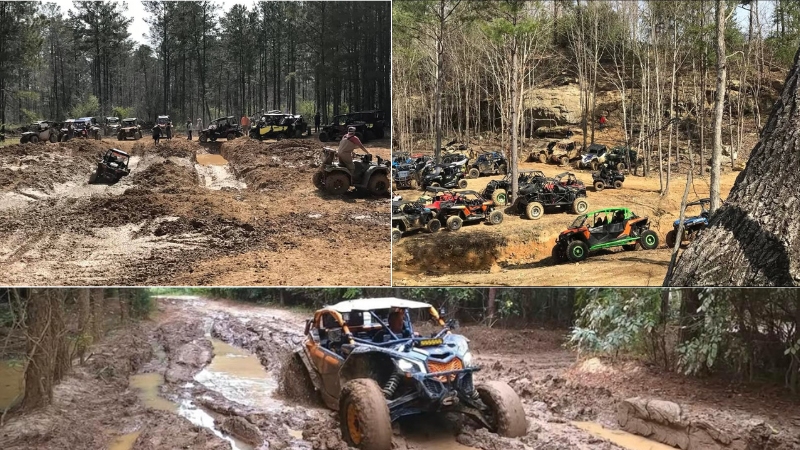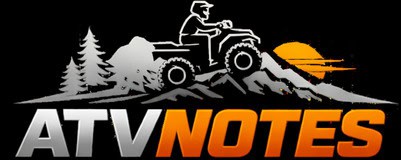Unlike conventional cars moving on highways and tracks with smooth terrains, ATVs run in diverse off-road landscapes. Whether it is smooth terrain or off-road beaten paths, your ATV moves crawling rocks or riding deep mud and brings fun alone or with friends.
To keep ATV accidents at bay, the states popular for ATV riding have enforced specific laws and regulations governing how one can ride an ATV in the area. All the ATV zones in US like Alaska, Minnesota, Maine, California, Utah and the rest have ATV laws to abide by if you wanna hit trails there.
If you want to explore the fabulous ATV sites of Alabama, you need to know the Alabama ATV laws to avoid getting on the wrong side of the law. Thankfully, this article will inform you about ATV regulations and laws in Alabama State.
Recommended Read: Understanding Oregon’s ATV Laws and Regulations
Jump To Contents
- Why is Alabama So Special to ATV Riders?
- What Qualifies as an ATV in Alabama?
- Do You Need to Register Your ATV in Alabama?
- Are ATVs Street Legal in Alabama?
- Where Can You Legally Ride an ATV in Alabama?
- Age Restrictions: How Old Do You Have to Be to Ride an ATV in Alabama?
- ATV Safety Gear Requirements in Alabama
- Do You Need a License or Permit to Ride an ATV in Alabama?
- Insurance and Liability: Are You Covered on an ATV?
- What Are the Fines and Penalties for Breaking ATV Laws in Alabama?
- Special Rules for Hunting, Farming, and Work-Use ATVs
- ATV Laws for Visitors and Out-of-State Riders in Alabama
- Tips for Staying Legal and Safe on an ATV in Alabama
- Recent and Upcoming Changes to Alabama ATV Laws
- Know the ATV Laws in Alabama, Enjoy the Ride
Why is Alabama So Special to ATV Riders?
You are not allowed by law to ride an ATV on public roads in Alabama unless under exceptional circumstances. However, there are some places where you can ride an ATV and have unprecedented fun. These spots offer every fun you want and can enjoy as a Powersports enthusiast. You can unleash your adventurous self, go for every power sports frenzy in general, and become an ATV dare-devil.
After all, Alabama boasts impressive ATV rails and attractive parks where you can ride an ATV, motorcycle, or race motocross competition during vacations, weekends, or holidays. It is important to note that these parks and trails are public and privately owned.
Therefore, you can choose whether you want to ride your ATV in a public or private park. Some of these parks and trails include:
- Bankhead national forest trails
- Top trails park
- The ridge resort
- Southern ridge park
- Bama Slam
- Kentuck ATV trail
- Beason’s ATV Park
- Manooka OHV park
- BullPen ATV park
- Flint Creek
- Mudders Off Road Park

What Qualifies as an ATV in Alabama?
Before we talk about laws, let’s be clear on what exactly counts as an “ATV” under Alabama rules. Not every off-road vehicle is treated the same.
Legal Definition of an ATV
In Alabama, an All-Terrain Vehicle (ATV) is generally defined as a motorized off-road vehicle designed to travel on four low-pressure tires with a seat straddled by the operator and handlebars for steering. This typically includes most recreational four-wheelers.
ATV vs UTV vs OHV – Know the Difference
- ATVs are single-rider or sometimes two-up vehicles with handlebar steering.
- UTVs (Utility Task Vehicles), also called side-by-sides, have car-like controls and seating.
- OHVs (Off-Highway Vehicles) is a broader category that includes dirt bikes, ATVs, UTVs, and dune buggies.
Why does this matter? Because not all of them follow the same legal rules, especially when it comes to registration or riding on public lands.
Do You Need to Register Your ATV in Alabama?
Thinking about getting your ATV “official”? Here’s the deal on whether Alabama requires any paperwork.
Registration Requirements (Or Lack Thereof)
Unlike cars or motorcycles, ATVs do not need to be registered or titled for recreational use in Alabama. That said, if you use your ATV in a commercial setting or for farming, registration might be required depending on local ordinances.
When It Might Be Needed
- Riding on certain public lands (like Wildlife Management Areas) could require a permit.
- Local municipalities may require registration for UTVs or side-by-sides—check with your county.
Bottom line: No statewide registration law for ATVs—but always check local rules if you’re unsure.
Are ATVs Street Legal in Alabama?
Can you take your four-wheeler to the gas station or down a country road? Spoiler: Probably not legally.
No, They’re Not Street Legal (But There Are Workarounds)
In general, Alabama law prohibits ATVs from operating on public roads and highways. That includes county roads unless otherwise marked.
The Exceptions
- Crossing a road legally: You can cross a street with an ATV to reach a trail on the other side.
- Farming or work use: Agricultural riders can sometimes use public roads, depending on their county.
- Designated public trail connectors: These are rare but may exist in certain ATV-friendly zones.
Penalties for Illegal Use
Getting caught riding your ATV on a public road without a permit or exception can lead to fines or even impoundment of your vehicle.
Recommended Read: Guide to Nevada ATV Laws and Regulations
Where Can You Legally Ride an ATV in Alabama?
One of the biggest questions riders have is: “Where am I actually allowed to ride my ATV without getting into legal trouble?” Let’s clear that up with the main legal options across the state.
Public Lands and Trail Systems
Riding an ATV on public land in Alabama is allowed—but only in designated areas. Not every patch of forest or open field is fair game.
Talladega National Forest
- Offers a few marked OHV (Off-Highway Vehicle) trails where ATV use is permitted.
- Must follow trail signage, posted speed limits, and safety gear rules.
- No registration required, but you may need a trail permit depending on the area.
Bankhead National Forest
- Limited ATV access—mainly for maintenance or specific trails.
- Always check with the local ranger district office before riding here.
State Wildlife Management Areas (WMAs)
- ATV use is often allowed only during hunting seasons, and only on roads marked for motorized use.
- You’ll need a WMA License in addition to a hunting license, even just to access the area on an ATV.
- Riding off established roads or trails is typically prohibited and can result in fines.
Tip: WMAs are overseen by the Alabama Department of Conservation and Natural Resources. Always check their latest map and rules before heading out.
Private Property
This is where the rules are most flexible.
- You can ride freely on land you own or have permission to use.
- No helmet or age restrictions are legally enforced on private property, although safety is still recommended.
- Just make sure you’re not crossing into someone else’s land without permission—even unintentionally.
If you’re part of a private hunting club or agricultural co-op, your ATV use is usually unrestricted, as long as you’re within the club or organization’s guidelines.
Alabama’s ATV Parks (Privately Owned, Open to Public)
These are the go-to places for recreational ATV riders, especially those without land of their own.
Popular ATV Parks in Alabama:
- Top Trails Park (Talladega) – Over 2,800 acres with trails for beginners to pros.
- Minooka Park (Jemison) – Family-friendly with well-maintained trails and camping facilities.
- Boggs and Boulders (Brooklyn) – Known for its mud pits, rocks, and weekend events.
- Southern Ridge ATV Park (Dozier) – Offers trail riding, racing events, and camping.
Each park sets its own rules regarding age limits, helmet requirements, vehicle types, and speed restrictions. Most require:
- Waivers for all riders
- Minors accompanied by an adult
- DOT-approved helmets
County and Rural Roads (Rare, Limited Use)
Some rural counties may have ordinances allowing limited ATV use on county-maintained roads, especially for:
- Farm work
- Travel between fields
- Accessing hunting areas
These are rare exceptions, not the norm. Most public roads—even dirt roads—are legally off-limits unless otherwise posted. Always check with your county clerk or sheriff’s department.
Quick Recap: Where You Can or Cannot Ride Legally
✅ Your own property (no restrictions)
✅ Private property with permission
✅ Designated OHV trails in national forests
✅ Approved ATV parks
✅ Some WMA lands (with permits)
❌ Public roads/highways (with few exceptions)
❌ Undesignated areas of public land
Age Restrictions: How Old Do You Have to Be to Ride an ATV in Alabama?
If you’re wondering whether your kid can hop on an ATV—or if you’re a teen wanting to ride—read this part carefully.
Minimum Age Rules
- There is no statewide minimum age to ride an ATV on private land.
- However, many public trails and parks enforce a minimum age of 12 or 14 to operate a vehicle.
Supervision for Minors
- Riders under 16 must be supervised by an adult in many public areas.
- ATV parks may also require waivers signed by parents or legal guardians.
Legal Risks for Parents
If a minor causes injury or damage while riding illegally or unsupervised, parents may be held legally liable.
ATV Safety Gear Requirements in Alabama
Let’s be real—crashing an ATV without gear hurts. But what does Alabama law say about helmets and protection?
Is a Helmet Required?
- For riders under 16 on public lands, YES, helmets are mandatory.
- For adults, helmets are strongly recommended, even if not strictly required by law.
Other Protective Gear
- Eye protection: especially in wooded trails
- Gloves and boots: for grip and impact protection
- Chest guards and long sleeves: for trail debris and falls
Are Safety Courses Required?
Not required statewide, but many ATV parks and WMA areas recommend or offer them. They’re also smart for new riders.
Do You Need a License or Permit to Ride an ATV in Alabama?
If you’re not old enough to drive a car, can you still ride an ATV legally? The answer depends on where you’re riding.
Driver’s License: Not Usually Needed
If you’re riding on private property or legal trails, no driver’s license is required.
When Permits Are Required
- Wildlife Management Areas (WMAs) require special licenses.
- Trail systems on public land may have user fees or passes.
Out-of-state riders? Bring your home state’s OHV or trail permit if applicable.
Insurance and Liability: Are You Covered on an ATV?
Most people don’t think about ATV insurance—until something goes very wrong.
Is Insurance Required?
Nope, Alabama doesn’t mandate insurance for ATVs.
Why You Should Consider It Anyway
- Covers damage or theft
- Liability for injuries caused to others
- Helps protect your home insurance from claims
Check with your provider—some homeowner’s policies don’t cover off-road use unless you ask for a rider.
What Are the Fines and Penalties for Breaking ATV Laws in Alabama?
“It’s just a quick ride down the road” can cost you more than you think.
Common Violations and Fines
- Riding on public roads: $100–$500 fines or more
- No helmet (underage riders): Penalties vary by county
- Trespassing: Can lead to misdemeanor charges or worse
Can Police Impound Your ATV?
Yes, especially if you’re riding illegally on roads or creating a nuisance.

Special Rules for Hunting, Farming, and Work-Use ATVs
Not all ATV use is just for fun. Alabama has different rules if you’re riding for work or hunting.
Farming and Agricultural Use
Farmers using ATVs for work may have more legal leeway, especially on private and rural land.
Hunting Regulations
- Firearms must be unloaded and secured when transported on an ATV.
- Certain hunting areas allow ATV use during open seasons, but only on designated trails.
Recommended Read: California ATV Laws – An Ultimate Guide
ATV Laws for Visitors and Out-of-State Riders in Alabama
Visiting from out of town? Here’s what you need to know before bringing your four-wheeler along.
Do You Need an Alabama Permit?
Not for private land—but you may need trail passes or WMA licenses for public use.
Registration and Safety Rules
Your ATV doesn’t need to be registered in Alabama, but you still must follow all state safety laws (like helmets for kids, and no road riding).
Is it illegal to ride a four-wheeler in a neighborhood?
When it comes to neighborhood recreational activities, riding a four-wheeler is often a popular choice. However, many people need clarification on the legality of doing this in their neighborhoods. Understanding the laws surrounding four-wheeler riding is essential before you decide to take it out for a spin.

In general, the legality of riding a four-wheeler in your neighborhood depends on which state or city you live in and what type of vehicle it is. For instance, some states allow off-road vehicles such as ATVs and dirt bikes on public streets, while others may not. Alabama dirt bike laws and codes do not allow powersports vehicles in the state.
Additionally, certain restrictions or speed limits apply when using these vehicles in certain areas. Before heading out for a ride, check your local laws and regulations regarding off-road vehicles to avoid any penalties or fines associated with illegal use.
Tips for Staying Legal and Safe on an ATV in Alabama
Riding an ATV is exhilarating, but safety and legality should always be your top priorities. Here’s how to ensure both.
Always Wear Protective Gear
Regardless of age, wearing appropriate safety gear is crucial. This includes a DOT-compliant helmet, goggles, gloves, long sleeves, long pants, and over-the-ankle boots. Such gear protects against injuries from falls, debris, and environmental elements.
Ride the Right Size ATV
Ensure the ATV matches the rider’s age and size. Children should not operate adult-sized ATVs, as they may lack the strength and coordination required, increasing the risk of accidents.
Avoid Paved Roads
ATVs are designed for off-road use and are not safe on paved surfaces. Riding on public roads is illegal in Alabama, except when crossing at designated points.
Never Ride Under the Influence
Operating an ATV under the influence of alcohol or drugs impairs judgment and reaction time, leading to accidents. It’s both dangerous and illegal.
Supervise Young Riders
Children under 16 should always be supervised by an adult when riding an ATV. Adult supervision ensures adherence to safety practices and immediate assistance in case of emergencies.
Take a Safety Course
While not mandatory in Alabama, enrolling in an ATV safety course is highly recommended. These courses teach essential riding skills and safety measures, reducing the risk of accidents.
Inform Someone of Your Plans
Before heading out, let someone know your riding plans, including your route and expected return time. This precaution ensures help can reach you promptly in case of an emergency.
Respect Private Property
Always obtain permission before riding on private land. Trespassing can lead to legal consequences and damages relationships with landowners.
Recommended Read: Guide to ATV Laws in Michigan for Off-roaders
Recent and Upcoming Changes to Alabama ATV Laws
Alabama’s laws don’t change often, but when they do, you’ll want to be ready.
- Some counties have tightened age and helmet requirements.
- There’s ongoing discussion about creating trail registration systems for conservation funding.
- ATV advocacy groups are working to expand legal trail access—so stay plugged in.
Know the ATV Laws in Alabama, Enjoy the Ride
Riding ATVs in Alabama is an absolute blast—but only if you’re doing it legally. From helmets and age limits to trail permits and property rights, the rules are there to keep you safe and others protected. So before you rev that engine, make sure you’re legal, geared up, and ready for the ride. Trust us—it’s a lot more fun when you’re not worried about fines or flashing lights in your rearview.
Relevant Reads include:
ATV Laws in Colorado: Every Detail to Know Before Ride

ATVNotes is an off-road resource focused on ATV and UTV winching, recovery systems, safety gear, tires, batteries, and essential off-road equipment. Content is produced by the ATVNotes Expert Team and written from the perspective of a practical off-road recovery advisor, emphasizing real-world performance, system compatibility, and safety-first practices across trail riding, utility use, and off-road exploration.
